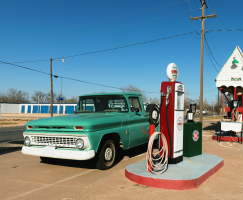
— The Environmental Protection Agency (EPA) says it's time to lower current greenhouse gas standards for model year 2022-2025 vehicles because current standards are allegedly based on outdated information that is too stringent.
EPA Administrator Scott Pruitt says low-income consumers are literally unable to purchase new cars and the growth of electric vehicles has been below previous estimates.
The agency made a January 2017 determination that at the time showed trends and data for 2012-2015 vehicles where it looked like major automakers were “over-complying” with their requirements and building up credits.
The EPA now says the latest data shows that starting with model year 2016 vehicles, many companies for the first time had to rely on credits in order to comply with the program. In addition, the agency believes this will happen again for 2017 models.
The EPA claims automakers are relying on banked credits, which suggests it could be even more difficult for companies to comply with standards in the future as they deplete their credits.
President Trump warned in March 2017 that emissions standards would need to be reviewed if the standards threatened auto jobs and changes would be made to "protect the economic viability of the U.S. automotive industry.”
According to the EPA, the Obama administration "short-circuited" the process and quickly released its final emissions determination just days before leaving office, causing the EPA and the Department of Transportation to reinstate the midterm evaluation process. Both agencies say they started collecting comments and data in August 2017.
California is the wildcard in the process because the state was granted a waiver to create and impose stricter standards than set by the EPA, but that waiver is now being reconsidered by the EPA.
Under the Clean Air Act, the federal government sets national standards for vehicle tailpipe emissions, and although California was granted a waiver, Pruitt says one state cannot dictate standards for the rest of the country.
Although California does currently follow national standards that require the average fuel economy to be at least 54.5 miles per gallon by 2025, the state says it won't go below that standard.
Automakers are worried about facing one set of standards for California, then another set of standards for the rest of the country. Ford, for example, says it isn't asking for standards to be rolled back and wants one set of standards nationally.
However, other automakers say they will have a tough time reaching emissions standards as currently set.
Toyota said compliance with the current requirements through model year 2025 vehicles require more gasoline hybrid electric vehicles or more sophisticated forms of "vehicle electrification at sales volumes significantly higher than EPA estimates," and at levels the market is unable or unwilling to support.
Toyota further said it disagrees with the EPA’s past assessment that lighter vehicles powered by less expensive gasoline powertrains will be good enough to comply with standards.
Fiat Chrysler (FCA US) says its data shows "more technology is necessary than the agencies have assumed for 2022-2025 MY [model year] compliance. The advanced technologies needed, including higher levels of electrification will negatively affect affordability, lowering sales, and ultimately impacting jobs.”
Mercedes-Benz estimates it will need more than 25 percent of its vehicles to be electric to meet standards in 2025, a huge increase over the 7 percent originally projected by the EPA.
As for California, Attorney General Xavier Becerra said the state won't be a spectator to the show and will file suit against the federal government to "fight the Administration’s war on our environment."
The EPA and the National Highway Traffic Safety Administration are working on details when comments can be made concerning the rulemaking process.




